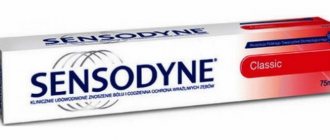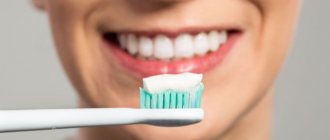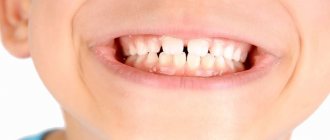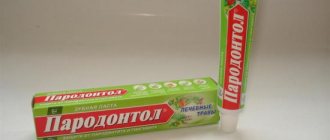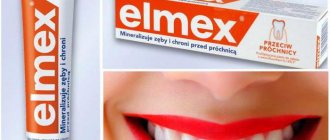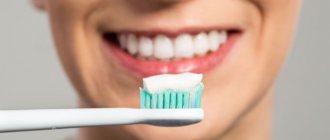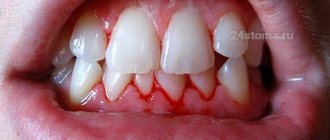Currently, hyperesthesia of hard dental tissues - sensitive dentin (K03.80 according to ICD-10) - is a fairly common pathology among dental diseases, since almost 40-70% of the adult population exhibit its symptoms. Dental hypersensitivity is clinically manifested by a short-term painful reaction of tooth dentin that occurs in response to the action of various stimuli (temperature, chemical, tactile, osmotic). The pain reaction can be of varying intensity - from mild discomfort to piercing pain, making it difficult to eat and maintain oral hygiene.
By origin, dentin hyperesthesia can be associated with the loss of hard tooth tissues both during caries and non-carious lesions, and during periodontal diseases. It is known that the degree of increased tooth sensitivity that develops as a result of the loss of hard tissues depends on many processes, including the number of exposed dentinal tubules, the rate of abrasion of hard tooth tissues, and the reactivity of the dental pulp.
The concept of the odontoblast theory suggests that the odontoblasts of the peripheral pulp layer are the receptors that receive and transmit irritation impulses to the sensory nerve endings located in the dentinal tubules. Therefore, the appearance and persistence of pain during hyperesthesia of hard dental tissues occurs with apoptosis of odontoblasts with open dentinal tubules containing fluid. Another mechanism for the occurrence of pain during hyperesthesia of hard dental tissues, according to the theory of direct nerve endings, is realized due to the direct effect of irritants on the receptors of nerve endings in the dentinal tubules of pulpal origin. However, impulse transmission is possible only when the nerve endings occupy the entire space of the dentinal tubules, and this is not always the case.
Currently, the hydrodynamic theory of increased sensitivity of teeth is relevant, which most likely explains the mechanism of pain. An increase in fluid movement in the dentinal tubules occurs under the influence of external stimuli - temperature or food. In the future, this contributes to a change in pressure in them, leading to irritation of the nerve endings and increased sensitivity of the teeth, which increases if the surface of the dentin is exposed and the dentinal tubules are open. Therefore, the most effective treatment of hypersensitivity of hard dental tissues is possible by eliminating the increased fluid flow in the dentinal tubules. It is known that hypersensitivity of hard dental tissues occurs when they are locally damaged, such as erosion, abfraction defects, increased tooth abrasion, and periodontal diseases that occur with gum recession.
Clinically, hyperesthesia of dental dentine is manifested by short-term pain, both local and generalized. Pain can be caused by exposure to cold air, as well as chemical and mechanical irritants. Treatment of dental hyperesthesia is possible using minimally invasive therapy. It is important to deeply saturate the hard tissues of the tooth with active components with desensitizing properties. Therefore, regular use of various preventive agents, namely toothpastes containing desensitizing agents, is very important. Modern treatment of hyperesthesia is based on restoring osmotic pressure in the dentinal tubules, their obturation with mineral substances similar in chemical composition to hydroxyapatite, in order to strengthen the strength of the crystal lattice of hard dental tissues.
One of the toothpastes designed specifically to reduce tooth sensitivity is Sensodyne Instant Effect toothpaste. This toothpaste helps reduce pain and sensitive teeth in 60 seconds and protects against caries due to its fluoride content. By brushing your teeth 2 times a day, an insulating layer is created on the surface of the dentin and inside the dentinal tubules. The active ingredients of Sensodyne Instant Effect toothpaste are sodium fluoride and tin fluoride (the mass fraction of fluorides is 1450 ppm).
The purpose of the study was to determine the clinical effectiveness of Sensodyne Instant Effect toothpaste in reducing dental hypersensitivity.
BlanX MED Teeth
This product tops the rating. Its creators are a proven, popular Italian company. This remedy can correct the problematic situation. If the lesions are significant, the doctor may prescribe fluoridation of the teeth. After the procedure, he will help you choose the right paste aimed at vulnerable crowns. Features of this product:
- When used, oxygen atoms are released.
- They gently clean plaque from units without damaging the enamel.
- The use of this product is harmless and effective.
- Optimal combination of lightening and care for sensitive chewing organs.
The product formula consists of natural ingredients. Its basis is Icelandic moss, which has healing properties. The extract is able to affect the surface of crowns and the inner layers of incisors, fangs, molars, prevent the inflammatory process, and successfully fight pathogenic bacteria. Monofluorophosphate and sodium fluoride strengthen dentin well.
Care sequence for sensitive teeth
Expensive toothpaste may not always give the desired result. At the same time, even with a cheaper remedy you can quickly cope with painful sensations. Therefore, we have prepared some tips for increasing the effectiveness of hygiene products.
Nutrition adjustments
In the vast majority of cases, acute pain is caused by certain foods or their temperature during eating. Therefore, first of all, you need to exclude irritants from your diet:
- carbonated drinks;
- citrus;
- alcohol;
- dairy products.
At the same time, monitor the temperature. Freshly prepared food should be cooled, and frozen food should be warmed to room temperature.
Reduce mechanical stress
During the cleaning process, the bristles of a hard and medium toothbrush have a rough mechanical effect on the enamel and periodontium. When they touch exposed dentin, a pain signal is instantly transmitted along the nerve endings. Therefore, the first thing you need to do is replace the brush with a soft one.
If, due to hypersensitivity, it hurts you even to touch the surface of your teeth with a brush, you need to relieve acute manifestations. Take a paste containing potassium nitrate, apply it on your finger and massage the gum. When sensitivity subsides, brush your teeth using a toothbrush.
Extend the effect of toothpaste
The components actively block the dentinal canals while they act on them during cleaning. If you increase the duration, the effect will be better. But brushing for more than three minutes can lead to mechanical irritation. Therefore, at the end of the procedure, before spitting out the foam, you need to rinse your mouth with it for a longer time.
In the article, we analyzed in detail which toothpaste to choose for sensitive teeth, how to use it correctly and which brands to give preference to. It is important to understand that such problems require consultation and monitoring by dentists. Hygiene products are only a way to maintain the effect after medical care.
If you find an error, please select a piece of text and press Ctrl+Enter.
Lacalut Extra Sensitive
Such toothpastes are very popular for reducing tooth sensitivity. Its main advantage is action in several directions simultaneously.
- The mixture blocks nerve endings, which reduces pain.
- The product saturates the enamel structures with useful elements.
After use, the surface of the crowns is covered with a protective film, which remains on the chewing organs for several hours. This helps fluoride penetrate deep into the enamel. Vulnerability quickly normalizes, and the risk of developing caries decreases. In addition to the optimal fluoride content, this paste is saturated with many beneficial minerals. Among them are potassium and sodium fluoride. The composition is selected to reduce hyperesthesia.
Patient reviews
Margarita, 41. My review will be about Sensodyne paste for hypersensitive teeth with fluoride. I got it after the doctor removed tartar from the enamel and an acute reaction to irritants, especially food, appeared. After using the drug, the unpleasant symptoms quickly disappeared. The cost of the gel in the pharmacy is about 188 rubles, but the effect is worth the investment. In addition to reducing sensitivity, the product also freshens breath for a long time and cleanses the oral cavity of plaque.
Victor, 30 years old. When the enamel sensitivity increases, I always use Elmex. The cost of the product does not exceed 250 rubles, and it is spent quite economically. The consistency of the gel resembles something between a paste and a gel. Among the disadvantages, I can note the poor foaming of the gel and its low cleaning ability. However, it helps to cope with the problem of sensitivity in 2-3 days. The paste cannot be used constantly, as the manufacturer writes. The optimal time of use is in courses of 60 days with breaks.
Oral-B Sensitive Original
Today, special products are often used that have an immediate effect. This line includes Sensitive Original. The basis of the composition is hydroskiapates. This substance is an analogue of natural enamel. It perfectly strengthens crowns. The enamel layer is quickly restored. Also, the nerve endings are not irritated by external factors. If the remedy is used systematically, hyperesthesia is reduced or eliminated completely. The mixture does an excellent job of cleaning crowns from bacterial contamination and food particles, since it contains silicon dioxide. The smallest granules cope with cleaning tasks without damaging the enamel.
PresiDENT Sensitive
This substance is suitable even for very vulnerable enamel. Users note that the use does not cause discomfort. Main advantages of the product:
- The degree of abrasiveness is less than 25.
- Zero abrasion of enamel when cleaning.
- No injuries to the chewing organs and gums.
- High concentration of fluorine compounds - 1350 units.
All this allows for high-quality oral care. In addition, PresiDENT Sensitive eliminates mineral deficiencies in units. The enamel becomes strong and stops wearing off quickly. The level of vulnerability is significantly reduced. The active ingredients of the product are hydroxyapatite, sodium fluoride, potassium nitrate. The paste perfectly takes care of the oral cavity, eliminating discomfort and preventing caries.
Rules for choosing a drug
When choosing suitable dental care products, it is better to consult a specialist. He will select a remedy taking into account the patient’s problems and the degree of their manifestation.
When choosing a drug yourself, you need to pay attention to several nuances:
What to do if a tooth reacts to sweets
- The presence of a mark on the packaging stating that the drug is therapeutic and prophylactic and is intended only for sensitive enamel.
- The optimal level of abrasiveness of the paste is from 25 to 40.
- It is desirable that the product contains biologically active additives: strontium, zinc, fluorides. Thanks to this, the paste will have a comprehensive effect on oral care.
- Lack of simultaneous inclusion of calcium and fluorine. When interacting, the components turn into salts, which reduces the effectiveness of each of them. It is advisable that the preparations contain only one ingredient. It is effective to alternate products with fluoride and calcium separately.
- No aggressive components in the composition: triclosan, hydrogen peroxide, acids. These substances aggravate the course of hyperesthesia.
Also, when choosing products to care for sensitive teeth, pay attention to the consistency of the product: it should be gel. Such pastes have more pronounced healing characteristics.
It is better to give preference to well-known brands, such as Splat, Sensodyne, Lakalut, which have been producing oral care products for many years
It is not recommended to use products for sensitive enamel for a long time, as they have low cleaning ability. Regular use of drugs can lead to the formation of tartar and other related problems. It is best to use this paste while brushing your teeth in the evening, and use other formulations in the morning. You can be treated with a paste for sensitive enamel in courses with breaks.
ROCS Sensitive
Dentists advise some patients to undergo ultrasonic teeth cleaning. This is a modern procedure, after which the patient must carefully care for the oral cavity using a special product. For those clients who suffer from allergies, it is often recommended to use ROCS Sensitive as there is no fluoride in the mixture. The product is suitable for patients who do not have a deficiency of this element in the body. The abrasiveness of this product is lower than that of many daily hygiene products. This means that the abrasion of the enamel will be minimal, the crowns and dentin will not be injured. With this care, incisors, canines, and molars will look beautiful, without carious damage. The composition of the paste quickly normalizes the microflora of the oral cavity.
Calcium glycerophosphate restores the structure of the chewing organs well and saturates the crowns with useful minerals. Hyperemia is quickly eliminated with the help of hydroxyapatite particles. All defects on the crowns are instantly sealed. Xylitol and magnesium have a beneficial effect on enamel.
Advantages and disadvantages of drugs
The advantages of enamel strengthening products include several nuances:
- High level of fluorine-containing components. The substance has an antiseptic effect and prevents the formation of tartar in the cervical part of the teeth. Fluoride also resists caries well and stimulates the salivary glands.
- Content of strontium, potassium chloride, calcium citrate. The components have the ability to reduce the intensity of hyperesthesia by sealing the dentinal tubules and replenish the lack of essential microelements in the body.
- Low degree of abrasiveness. This factor is very important when caring for sensitive enamel, since coarse abrasive components can cause additional injury. With regular use of abrasives, gradual tooth destruction occurs.
- Presence of hydroxyapatite. The substance is responsible for the regeneration of damaged bone tissue and helps strengthen the natural protective forces of the enamel.
This type of product also has a number of disadvantages:
- High price. Typically, pastes for sensitive enamel are produced by well-known companies that inflate the price for the brand.
- Manufacturers do not always indicate the level of abrasiveness of the paste on the packaging. A product with a high content of abrasives can negatively affect the condition of teeth.
It is important to ensure that the paste does not contain calcium carbonate or aggressive bleaches. With increased fragility of the enamel, they will cause premature yellowing of the teeth, as well as the fact that they crumble.
Sensodyne with fluoride
This paste has an amazing effect on sensitive teeth! The product has high reliability and quality. Dentists often recommend it to increase the level of beneficial minerals in the hard tissues of the oral cavity. The mixture penetrates deeply into the dentin layers, acting on the internal canals. At the same time, the nerve endings become less vulnerable, the pain subsides or goes away. The product contains fluoride and potassium nitrate, which removes inflammation and strengthens the units. This product is medicinal, it is also used for prevention. In order not to aggravate the problems, the substance is applied to a brush with soft bristles. The paste can be used by adults and adolescents after they reach 12 years of age.
Components of toothpaste for tooth sensitivity
Before listing the active ingredients, let's talk about the process itself, which causes pain.
Beneath the layer of durable enamel are dentin tissues. They are the thinnest tubes in which liquid circulates. When the surface of the enamel wears away or the protective layer at the root at the base of the tooth becomes thinner, external irritants begin to act on the dentinal canals. Contrasting temperatures and some acids contained in foods accelerate the flow of liquid through the channels. This irritates the nerve endings and causes sharp pain.
Hygienic compositions designed to relieve dental hypersensitivity act in different ways. Some reduce the speed of fluid flow in the dentinal canals. Others protect them from external influences. The presence of active components in the formulation becomes decisive.
Potassium nitrate and chloride
Nerve impulses are transmitted between cells due to the exchange of potassium ions that are present inside the conductive channels. Excessive amounts of potassium nitrate and chloride block the transmission of nerve signals. Thanks to this, the painful sensations quickly disappear.
The peculiarity of the use of active substances in the formula of hygiene products is the suppression of symptoms. The paste has no therapeutic effect and is useless for long-term use. It only quickly blocks the pain, which returns after a short period of time.
Arginine with calcium carbonate
The effectiveness of these components is based on the deposition of calcium carbonate on tooth enamel. This promotes the deposition of phosphates on the surface of the exposed dentin structure. Open tubules become clogged, and the movement of fluid in them slows down. This action temporarily solves the problem, but cannot guarantee the absence of sensitivity in the long term.
Calcium fluoride, which was formed due to the presence of carbonate, does not show activity in restoring the dense shell. In this case, pastes containing active fluorine penetrate the tissues and restore them.
Strontium and zinc ions
The components clog the dentinal tubules, preventing the acceleration of fluid flow into them. Thanks to this, the root cause of pain is eliminated. In this case, strontium chloride creates dentin tissue that replaces damaged fibers. The structure is compacted and restored. With regular use of the product, hypersensitivity may completely disappear.
The main disadvantage is the slow action. Strontium and zinc ions are designed for long-term treatment. They cannot give a quick effect.
Of all the listed components, only the effect of potassium nitrate ions has been clinically proven. Research on other substances is contradictory. Therefore, the characteristics declared by the manufacturer do not always give results and the paste has to be selected individually.
Silca Complete Sensitive
If you experience pain while eating or after eating, you most likely have increased enamel vulnerability. It is for such patients that Complete Sensitive was developed.
- Its formula provides gentle care for the affected units.
- The low abrasiveness of the substance carefully removes plaque without damaging the enamel layer.
- Potassium citrate helps reduce discomfort from sour, sweet, cold, and hot foods.
- Orange oil extract takes care of the health of gum tissue.
Do you want your crowns to be strong and your smile to be amazing? Use the Complete Sensitive product systematically!
How to choose a toothbrush for sensitive teeth
The sensitivity of enamel occurs not only when exposed to chemical components or contrasting temperatures. Often painful sensations come from the mechanical pressure of the bristles on tissues weakened by diseases. When villi cause discomfort, you need to use special products with especially soft bristles.
A brush for sensitive teeth can be easily recognized even from a large assortment of hygiene products labeled “Soft”. Each fiber of such products has a soft structure and a rounded tip. Thanks to this, it does not injure the periodontium and damaged tooth tissues when touched.
Products intended for medicinal purposes are not suitable for daily use. Soft pile is not able to clean the surface well from dirt. Therefore, after restoring normal sensitivity, you need to return to your usual means. Otherwise, there is a risk of the appearance of an unpleasant gray plaque, and subsequently tartar.
SPLAT Professional Biocalcium
Comprehensive cleaning of the entire oral cavity is the key to good health. The procedure is carried out once every 6-12 months. After the session, dentists recommend using products that reduce the vulnerability of the chewing organs.
- The main element in this paste is biocalcium. It is isolated from eggshells. This element is a good building base for restoring enamel layers.
- Hydroxyapatite helps hard tissues form.
- Papain inhibits contamination of crowns.
- The saturation of active beneficial components strengthens dentin.
- Sodium bicarbonate normalizes microflora in the mouth.
The product carefully takes care of the oral cavity as a whole, healing gums, cleaning incisors, fangs, and molars. The new formula of this paste allows you to return the enamel to a healthy state.
New Pearl Calcium
This paste is universal. The whole family can use it. It is allowed for children from the age of three. The mixture has a preventive and therapeutic effect. If units react slightly to heat and cold, this product will eliminate such unpleasant sensations. The product strengthens the enamel well and reduces the vulnerability of the enamel. The mixture contains a large amount of calcium. It saturates the enamel with useful minerals. The paste contains potassium and fluorine. It is released slowly, so there will be no immediate effect. The substance acts gradually, gently.

